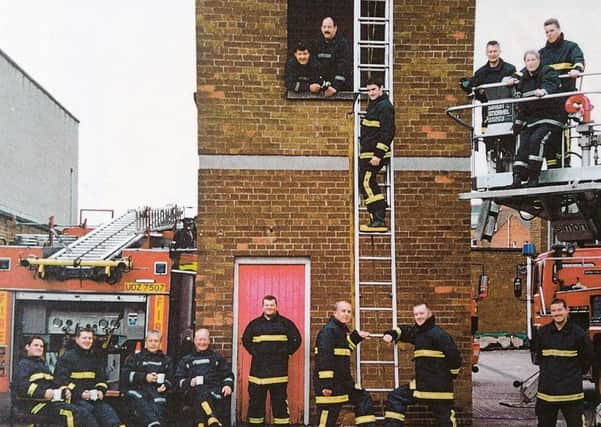Thirty years of dedicated service ends as Dale retires


During his career, Dale has served throughout Northern Ireland, has held a number of prestigious roles, and has risen through the ranks, taking on the top post of fire chief before taking the difficult decision to retire and leave behind the organisation that he has given his heart and soul to for three decades.
Dale, who is originally from Norwich, came to Northern Ireland as a young man and won the heart of Lisburn girl Christine when he was just 18.
Advertisement
Hide AdAdvertisement
Hide AdThe couple married and settled in Lisburn, where Dale joined his new wife and her family working at Barbour Threads at Hilden Mill.
“Generations of Christine’s family going back hundreds of years had worked there,” explained Dale. “I started work on the shop floor and then was promoted to management.”
However, when the Fire Brigade put out a call for new recruits, Dale knew that was where his heart truly lay and he applied in the hope of fulfilling his ambition to become a fire fighter.
“I just about managed to scrap in before the application deadline and I went through a long selection process of about a year to get the job,” he continued. “My first job was at Central Station in Chichester Street in Belfast and what an interesting place that was. Belfast in the 80s was an interesting place. There were bombs going off every day, as well as fires, incendiary devices, riots and public disorder featured heavily. It was terrible for the people involved but for a young fire fighter it was exciting,” he admitted.
Advertisement
Hide AdAdvertisement
Hide AdDale was then promoted to lead fire fighter and moved to the Springfield Road.
“When I was in West Belfast it was the first time I experienced a real sense of community,” he continued. “You had to be very much on your guard as there could be a negative reaction when you were called out sometimes. I would have to say about everywhere I have served that I have always enjoyed a positive reaction from most people. Most people have respect for us and are glad to see us.”
After three years at Springfield Road, Dale was moved to the other side of the city to Knock Station on the Newtownards Road.
“I was there for six years and that is really where I learnt my trade as a watch commander.”
Advertisement
Hide AdAdvertisement
Hide AdIt was during his time in East Belfast that the Drumcree stand off began, leading to road barricades and protests across Northern Ireland, with a large number of incidents in the Newtownards Road area of the city.
“I remember lifting a Swedish cameraman by the scruff of the neck after he had crawled into a burning building to shoot footage, I had to drag him out. Another incident I remember well was a fire in a row of houses which had been set deliberately. Gas canisters had been placed in the houses and set on fire to try to lure the police out. If they had exploded it would have killed dear knows how many people. The police had to surround us in a protective shield as we fought the fire and I felt like I was in Beirut or somewhere. It helped me learn how to deal with difficult situations and was an invaluable experience.”
Over the years Dale was stationed in various parts of Northern Ireland, including Portadown, Warrenpoint and Ballymena. Following a year working in the Fire and Rescue Service head quarters as the discipline officer, which he said was “a great experience”, Dale moved to his home town, the Lisburn Fire Station on the Prince William Road.
“I love Lisburn,” he revealed. “It was close to home and it was protecting my own community. I had three brilliant years in Lisburn and I very nearly never left.”
Advertisement
Hide AdAdvertisement
Hide AdIn the end he took the decision to move up the ladder, taking on a number of roles in HQ before becoming assistant chief fire officer, and then interim chief fire officer. However, he took the difficult decision not to apply for the post on a permanent basis, choosing to retire and leave the service in someone else’s capable hands.
However, without a doubt he left with his head held high and full of pride for the years of dedicated service he had devoted to saving lives in Northern Ireland.